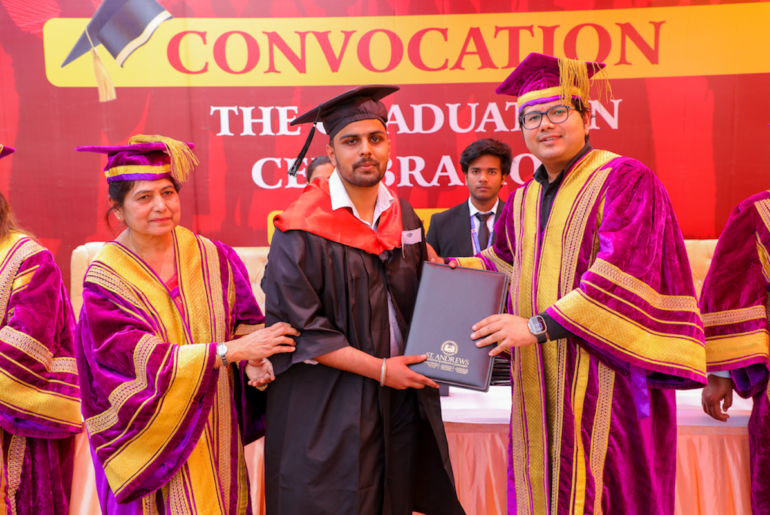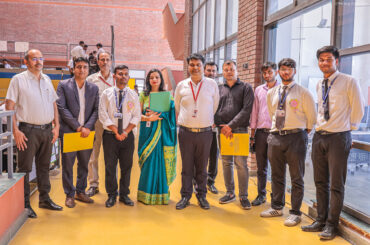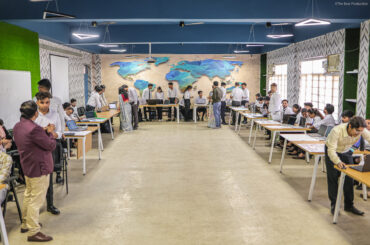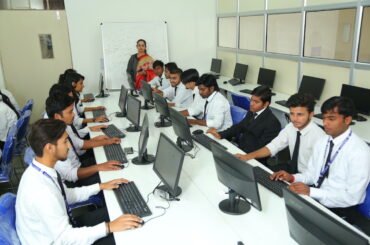BCA Eligibility Criteria
BCA Eligibility Criteria for the Bachelor of Computer Applications (BCA) program generally adhere to a standard framework, although they can vary slightly between institutions.
The minimum percentage required in 12th grade can range from 45% to 60%, depending on the college or university. Some institutions may also consider the scores from specific entrance exams as part of their eligibility criteria.
Moreover, there are often provisions for reserved category students that might include relaxation in the minimum percentage required.
Proficiency in English and basic computer knowledge, although not universally mandatory, are often considered beneficial for prospective BCA students.
Some of the most opted courses in India and St. Andrews college or different Engineering college or Management colleges are as follows:-
- Btech
- Btech CSE
- Btech ETCE
- MTech
- BCA
- BBA
- MBA
- MCA
- DPharma – St. Andrews College of Pharmacy
- BPharma – St. Andrews College of Pharmacy
- BArch – St. Andrews College of Architecture
Eligibility Criteria for BCA Course
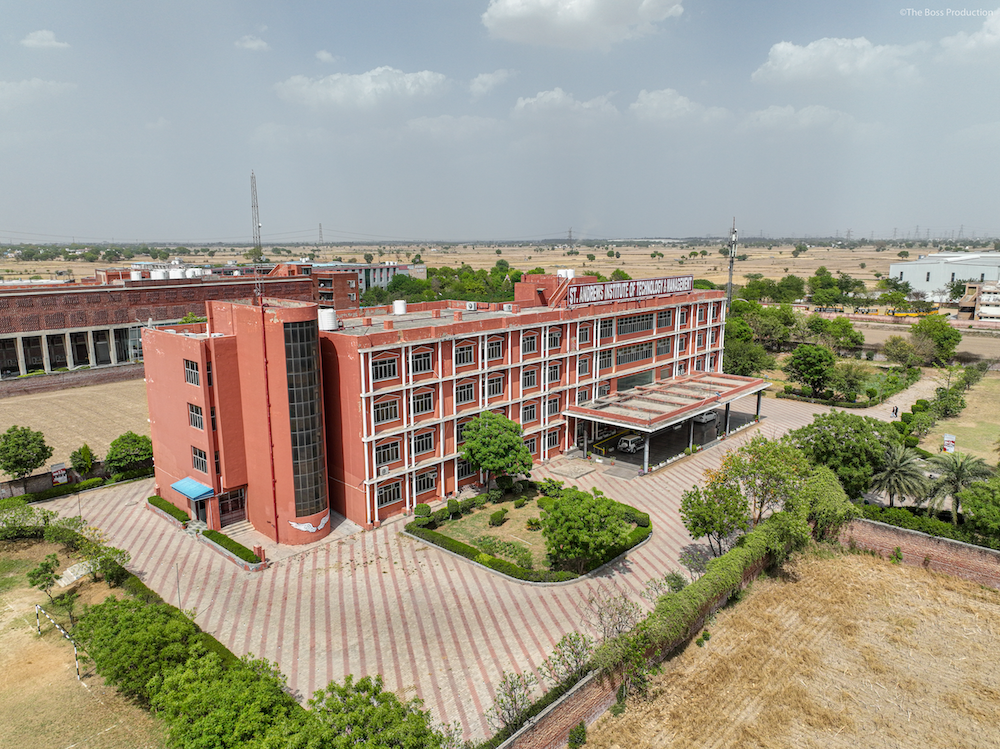
The eligibility criteria for BCA may vary slightly from one institution to another, but here are the general eligibility requirements:
Educational Qualifications
BCA Eligibility Criteria require candidates to have completed their 10+2 education from a recognized board or institution. They should have passed their higher secondary examination with a minimum percentage as specified by the respective institution or board.
Subjects
Some institutions may have specific subject requirements at the 10+2 level. Generally, candidates should have studied Mathematics as one of the main subjects in their higher secondary education. Some institutions may also prefer candidates who have studied Computer Science or Information Technology.
Minimum Percentage
Most institutions have a minimum percentage requirement for admission to the BCA program. This percentage can vary from institution to institution, but it usually falls between 45% to 50% in aggregate. However, some universities may have higher percentage requirements.
Entrance Exams (optional)
Some institutions or universities may conduct entrance exams for admission to their BCA program. These entrance exams test the candidate’s aptitude in areas such as Mathematics, Logical Reasoning, and English. The scores obtained in these entrance exams may be considered along with the candidate’s 10+2 marks for admission.
Age Limit
There is generally no specific age limit for admission to the BCA program. However, some institutions may have their own age criteria, so candidates should check the specific requirements of the institution they are applying to.
Reservation Criteria
BCA Eligibility Criteria for admissions may include reservation policies as per government regulations, similar to other undergraduate programs in India. This encompasses reservations for Scheduled Castes (SC), Scheduled Tribes (ST), Other Backward Classes (OBC), Economically Weaker Sections (EWS), and Persons with Disabilities (PwD). The specific percentage of seats reserved for each category can vary among institutions.
BCA Eligibility Criteria for Top Colleges
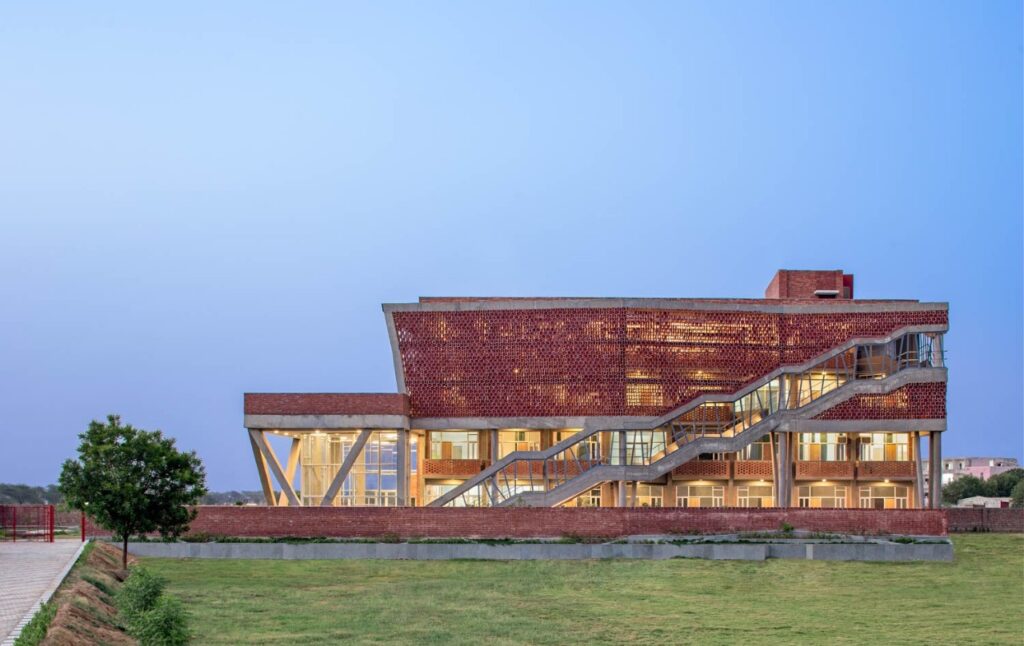
let’s delve into the eligibility criteria for some of the top colleges offering BCA programs:
Graduating from these top institutions can significantly enhance the career prospects of a BCA graduate.
St. Andrews Institute Of Technology and Management, Delhi
Educational Qualification
Candidates should have passed 10+2 examination from a recognized board in India or abroad.
Minimum Percentage
Minimum aggregate score of 50% in 10+2.
Additional Requirements
Personal interview and academic performance are also taken into consideration.
Christ University, Bangalore
Educational Qualification
Candidates should have passed 10+2 examination from a recognized board in India or abroad.
Subjects
Mathematics should be one of the main subjects in 10+2.
Minimum Percentage
Minimum aggregate score of 50% in 10+2.
Entrance Exam
Christ University conducts its own entrance exam, CUET (Christ University Entrance Test), which candidates need to clear for admission.
Additional Requirements
Personal interview and academic performance are also taken into consideration.
St. Xavier’s College, Mumbai
Educational Qualification
Completion of 10+2 from a recognized board.
Subjects
Mathematics should be one of the main subjects.
Minimum Percentage
Minimum aggregate score of 45% in 10+2.
Entrance Exam
St. Xavier’s College conducts its own entrance exam, and admission is based on merit.
Banaras Hindu University, (BHU)
Educational Qualification
Completion of 10+2 from a recognized board.
Subjects
Mathematics should be one of the subjects.
Minimum Percentage
Minimum aggregate score of 50% in 10+2.
Entrance Exam
Admission is based on the BHU Undergraduate Entrance Test (UET).
BCA After 12th commerce

Here’s a detailed introduction to pursuing BCA (Bachelor of Computer Applications) after completing 12th commerce:
Overview of BCA Program
BCA is a three-year undergraduate degree program that focuses on providing students with a strong foundation in computer science and its applications. It is designed to equip students with the necessary skills and knowledge required to pursue careers in the field of information technology. Becoming a BCA graduate opens up numerous career opportunities in fields such as software development, web development, and IT consulting.
Eligibility Criteria
To meet BCA Eligibility Criteria after 12th commerce, students must have completed their higher secondary education (10+2) from a recognized board with at least a 50% aggregate score. Some institutes may also require specific subjects like mathematics or computer science at the 10+2 level.
Course Curriculum
The BCA curriculum covers a wide range of subjects related to computer science and applications.
Some of the key topics included in the course syllabus are-
- Fundamentals of Computers
- Programming Languages (such as C, C++, Java)
- Data Structures and Algorithms
- Database Management Systems (DBMS)
- Software Engineering
- Web Development
- Operating Systems
- Networking
- Object-Oriented Programming
- Computer Architecture
Comparison of BCA with Other IT-related Courses After 12th Commerce

Here’s a comparison of BCA with other IT-related courses that students can pursue after completing 12th commerce:
BCA (Bachelor of Computer Applications)
- Focuses on: computer applications and software development.
- Subjects: like programming languages, database management, web development, and software engineering.
- Duration: Typically three years.
- Suitable for: students interested in software development, programming, and application development.
B.Tech in Computer Science and Engineering (CSE)
- Provides: a broader and more comprehensive understanding of computer science and engineering principles.
- Covers topics: such as algorithms, data structures, computer architecture, operating systems, and computer networks.
- Duration: Four years.
- Suitable for: students interested in hardware and software aspects of computer technology, including system design and development.
B.Sc. in Information Technology (IT)
- Focuses on: the theoretical and practical aspects of information technology.
- Covers subjects: like computer programming, database management, web development, and IT infrastructure management.
- Duration: Three years.
- Suitable for: students interested in a blend of computer science and information technology.
B.Com in Computer Applications
- Focuses on: Combines commerce subjects with computer applications.
- Covers subjects: like accounting, business management, and computer applications.
- Duration: Three years.
- Suitable for: students who want to specialize in both commerce and computer applications.
B.Sc. in Computer Science
- Offers: a more theoretical approach to computer science.
- Covers subjects: like mathematics, computer programming, algorithms, and data structures.
- Duration: Three years.
- Suitable for: students interested in a strong foundation in computer science principles.
Diploma in Computer Science/IT
- Provides: a focused and practical approach to computer science and information technology.
- Covers: basic concepts of programming, database management, and computer applications.
- Duration: Typically one to three years.
- Suitable for: students looking for shorter-term and more practical training in specific IT skills.
Bachelor of Information Science (BIS)
- Focuses on: the study of information science, including information systems, databases, and knowledge management.
- Covers subjects: like information retrieval, data analytics, and information security.
- Duration: Three years.
- Suitable for: students interested in the organization and management of information resources.
BCA Entrance Exams
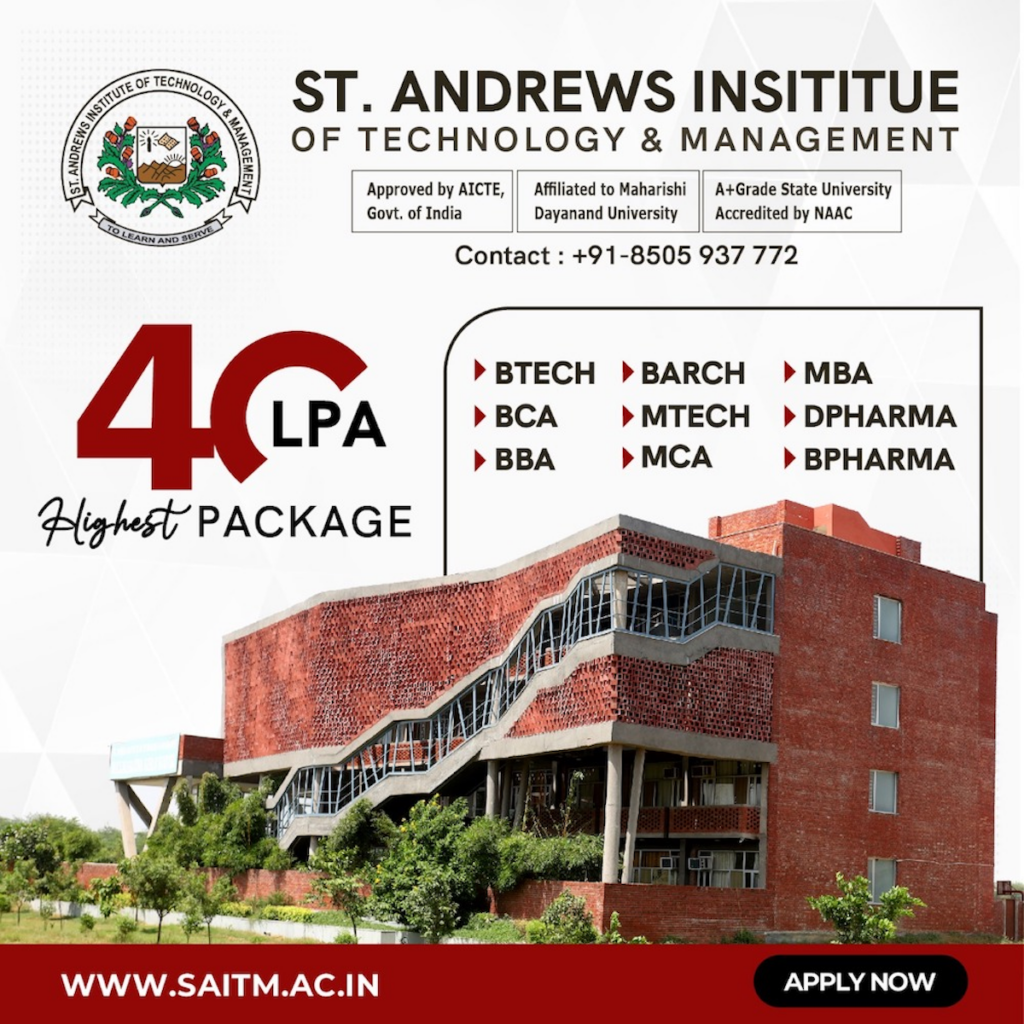
Various universities and colleges across India conduct BCA (Bachelor of Computer Applications) entrance exams as part of the BCA Eligibility Criteria to select candidates for their programs. These exams evaluate a candidate’s aptitude in areas such as Mathematics, Logical Reasoning, English, and Computer Awareness.
Here’s a detailed explanation of some common BCA entrance exams:
IPU CET (Indraprastha University Common Entrance Test)
Conducted by Guru Gobind Singh Indraprastha University (GGSIPU) for admission to various undergraduate and postgraduate programs, including BCA.
The exam usually consists of multiple-choice questions covering topics like Mathematics, English Language and Comprehension, and Computer Awareness.
The syllabus typically follows the 10+2 level curriculum.
BHU UET (Banaras Hindu University Undergraduate Entrance Test)
Conducted by Banaras Hindu University for admission to various undergraduate courses, including BCA.
The exam assesses a candidate’s proficiency in subjects like Numerical Ability, General Knowledge, and Reasoning.
CUET (Christ University Entrance Test)
Conducted by Christ University for admission to its undergraduate programs, including BCA.
The exam typically includes sections on Mathematics, English Language, Reasoning, and General Knowledge.
IGNOU BCA Entrance Exam (Indira Gandhi National Open University)
Conducted by IGNOU for admission to its Bachelor of Computer Applications (BCA) program through distance education.
The exam assesses a candidate’s knowledge in areas like Mathematics, Computer Awareness, and English Language.
NIMCET (NIT MCA Common Entrance Test)
Conducted by the National Institutes of Technology (NITs) for admission to their Master of Computer Applications (MCA) program, this exam’s scores are often accepted by many institutes as part of the BCA Eligibility Criteria for BCA admissions.
The exam assesses a candidate’s proficiency in Mathematics, Analytical Ability, Computer Awareness, and General English.
Top Colleges for BCA Admissions
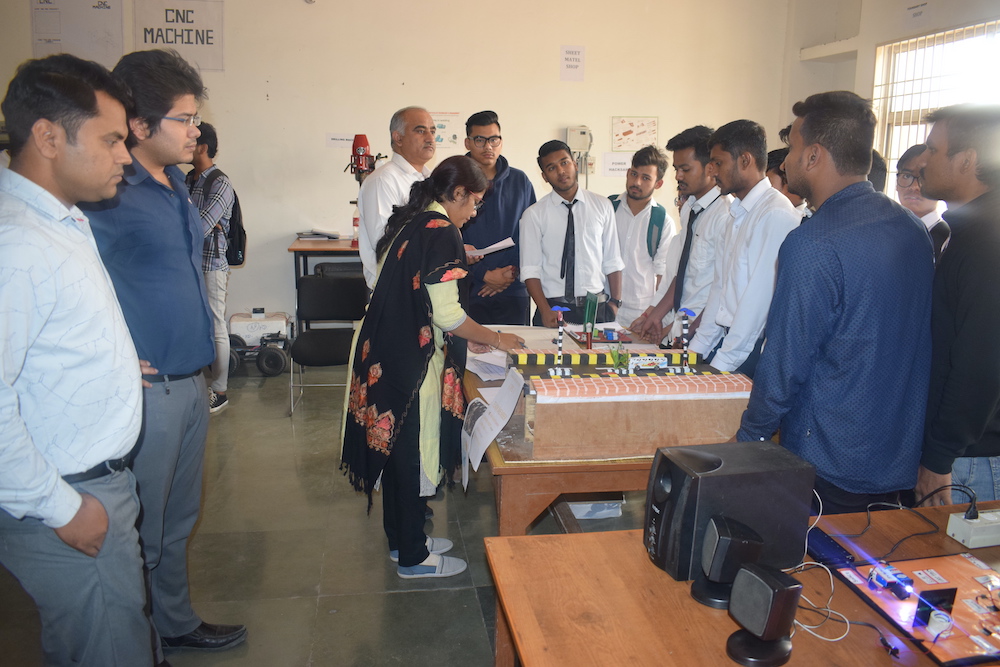
Here’s an overview of some of the top colleges in India for BCA admissions, including details about their programs, facilities, and other relevant information in line with BCA Eligibility Criteria.
St. Andrews Institute of technology and management
Program
St. Andrews Institute of technology and management College offers a three-year full-time BCA course.
Facilities
Heritage campus with modern facilities, well-equipped computer labs, library resources, and experienced faculty.
Placement
Decent placement opportunities with reputed companies visiting the campus for recruitment.
Extracurricular Activities
Active student societies, cultural events, and sports activities enriching student life.
Admission Process
Admission is based on merit, and the selection process on the basis of personal interview.
Christ University, Bangalore:
Program
Christ University offers a three-year full-time BCA course.
Facilities
State-of-the-art infrastructure, well-equipped computer labs, library facilities, and experienced faculty.
Placement
Excellent placement opportunities with reputed companies visiting the campus for recruitment.
Extracurricular Activities
Active student clubs and societies, cultural events, and sports facilities.
Admission Process
Admission is based on the Christ University Entrance Test (CUET) followed by a personal interview and academic performance.
Banaras Hindu University (BHU)
Program
BHU offers a three-year full-time BCA course through its Faculty of Science.
Facilities
Well-established campus infrastructure, modern laboratories, and extensive library resources.
Placement
Decent placement opportunities with companies from various sectors recruiting from the campus.
Extracurricular Activities
Vibrant campus life with cultural events, student clubs, and sports facilities.
Admission Process
Admission is based on the BHU Undergraduate Entrance Test (UET) followed by counseling and document verification.
St. Xavier’s College, Mumbai:
Program
St. Xavier’s College offers a three-year full-time BCA course.
Facilities
Heritage campus with modern facilities, well-equipped computer labs, library resources, and experienced faculty.
Placement
Decent placement opportunities with reputed companies visiting the campus for recruitment.
Extracurricular Activities
Active student societies, cultural events, and sports activities enriching student life.
Admission Process
Admission is based on merit, and the selection process may include an entrance test and/or personal interview.
Application Form and Document Verification

Here’s a detailed explanation of the application form submission and document verification process for BCA admissions in India:
Application Form Submission
Candidates need to obtain the application form for the BCA course from the official website of the respective college or university.
They should carefully fill out the application form with accurate personal, academic, and contact details.
Some colleges provide both online and offline application methods aligned with BCA Eligibility Criteria. For online applications, candidates must complete and submit the form electronically. For offline applications, they need to download the form, fill it out manually, and either submit it directly to the college’s admission office or send it via post.
Along with the application form, candidates may need to pay the application fee. The fee amount and payment methods will be specified in the admission notification or prospectus.
Document Verification
After the submission of the application form, colleges typically conduct a document verification process to authenticate the information provided by the candidates.
Candidates are required to submit the following documents for verification:
Class 10 Mark Sheet
This document serves as proof of date of birth and contains details about the candidate’s performance in the secondary school examination.
Class 12 Mark Sheet
This document provides details about the candidate’s performance in the higher secondary examination, including subjects studied and grades obtained.
Transfer Certificate (TC)
TC is issued by the last institution attended and certifies that the candidate has been a student of that institution. It may also include details about conduct and character.
Migration Certificate
This document is required for candidates who have completed their higher secondary education from a board other than the one affiliated with the college or university they are applying to.
Category Certificate (if applicable)
Candidates belonging to reserved categories such as SC, ST, OBC, or EWS need to submit category certificates issued by the competent authority.
Entrance Exam Scorecard (if applicable)
Candidates who have appeared for entrance exams need to submit their scorecards for verification.
Passport-sized Photographs
Recent passport-sized photographs of the candidate may be required for identification purposes.
Candidates should ensure that all documents are attested and submitted in the prescribed format specified by the college or university.
Counselling Process and Payment of Fees
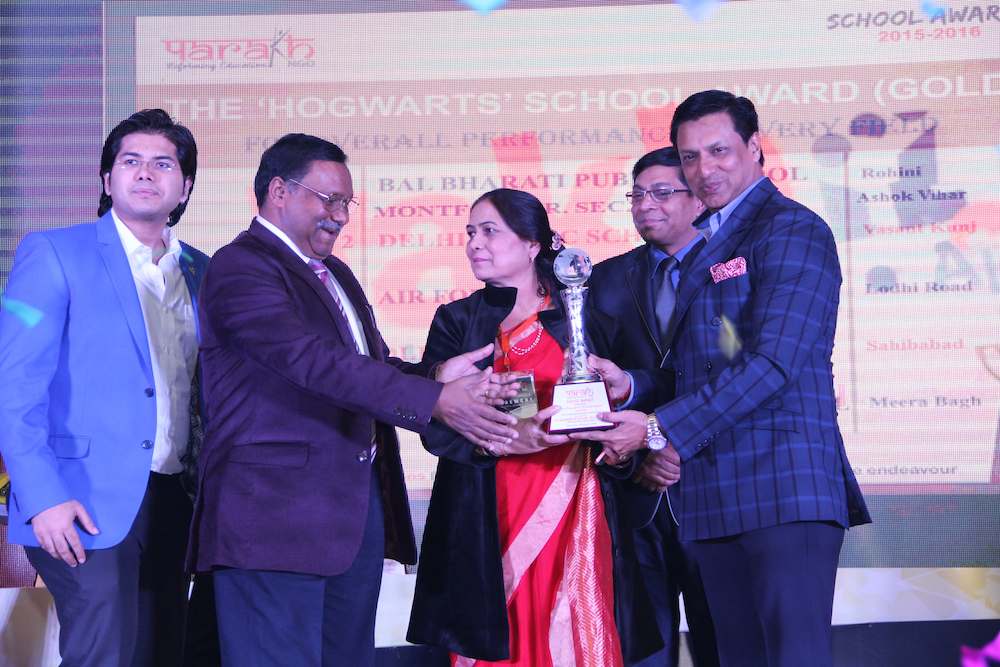
The counseling process and payment of fees for BCA course admission typically involve several steps, which I’ll outline below:
Counselling Process
Notification
After the application form submission and document verification process, colleges or universities usually release a notification or merit list indicating the names of shortlisted candidates for counseling.
Schedule
The counseling schedule, including dates, timings, and venue, is provided in the notification or through the college’s official website.
Counselling Rounds
Counselling may be conducted in multiple rounds, especially if there are a large number of applicants. Each round involves the allocation of seats to candidates based on their merit and availability of seats.
Documents Required
Shortlisted candidates are required to carry original documents for verification during the counseling process. These documents typically include mark sheets, certificates, identity proof, category certificates (if applicable), and other relevant documents.
Seat Allotment
Based on the candidate’s rank, preference of course and college, and availability of seats, seats are allotted during the counseling process. Candidates may have the option to freeze, float, or slide their allotted seats based on their preferences and availability.
Seat Confirmation
Once a seat is allotted to a candidate, they need to confirm their admission by paying the requisite admission fee within the stipulated time frame.
Payment of Fees
Admission Fee: After seat allotment, candidates are required to pay the admission fee to secure their admission. The admission fee varies from college to college and includes tuition fee, caution deposit, examination fee, and other applicable charges.
Mode of Payment
Colleges usually provide multiple payment options, including online payment through net banking, credit/debit cards, or offline payment through demand draft or bank challan.
Confirmation
After successful payment of the admission fee, candidates receive a confirmation of their admission. This confirmation may be provided through email, SMS, or a formal admission letter from the college.
Deadline
Candidates must ensure that they pay the admission fee within the stipulated deadline mentioned by the college. Failure to pay the fee within the specified time may result in the forfeiture of the allotted seat.
BCA Course Details
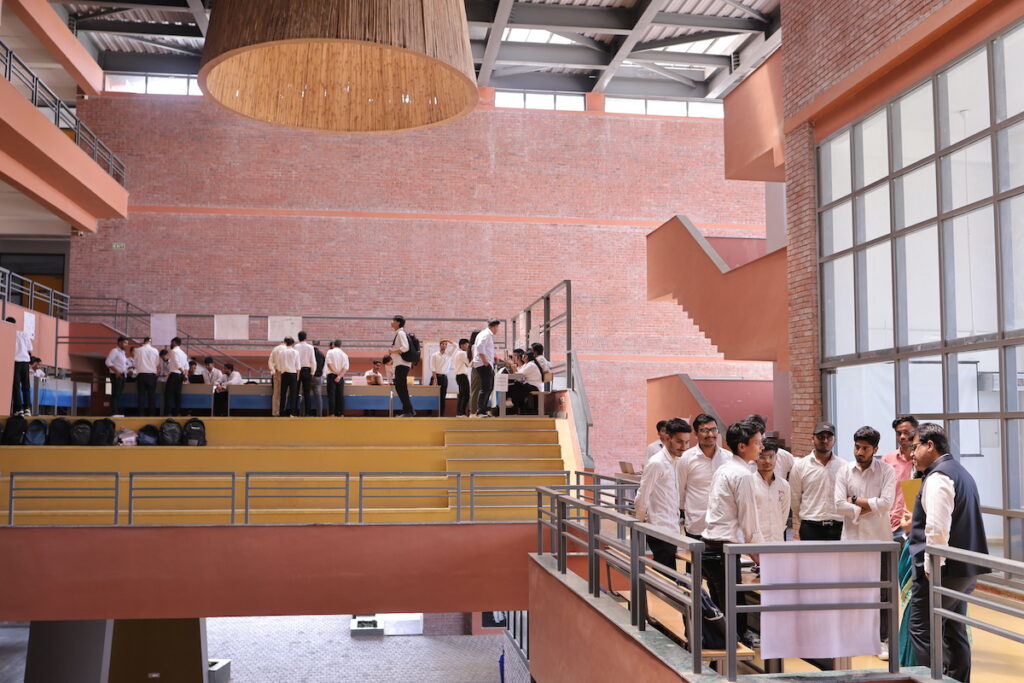
Highlights and Duration of BCA Course
Course level: Undergraduate
Duration: 3 years
Eligibility: Class 12 pass with at least 50% marks
Admission process: Merit-based/Exam-based
Average fee: INR 70,000 – 2 Lakh
Top colleges: St. Andrews institute of technology and management (SAITM), Gurgaon, Christ University, Loyola College and St. Joseph’s University etc.
Average salary: INR 2 – 8 Lakh
Top job profiles: Software Developer, Technical Analyst, System Administrators, Programmer, Tech Support
BCA graduates are well-equipped to pursue careers in software development, technical analysis, and system administration, among other IT roles.
BCA Courses Specializations

While BCA (Bachelor of Computer Applications) primarily provides a comprehensive foundation in various aspects of computer science and applications, some institutions offer specialized tracks or elective courses within the BCA course to allow students to focus on specific areas of interest. These specializations can provide students with advanced knowledge and skills in particular domains of computing.
Here are some common specializations that students might find within a BCA course:
Software Development
This specialization focuses on programming languages, software engineering principles, algorithms, and data structures. Students learn to design, develop, and maintain software applications for various platforms. Courses may cover topics such as web development, mobile app development, and software testing.
Networking
Networking specialization emphasizes computer networks, network protocols, network security, and network administration. Students learn to design, implement, and manage computer networks, including local area networks (LANs), wide area networks (WANs), and wireless networks.
Web Development
Web development specialization concentrates on designing and developing websites and web applications. Students learn front-end development technologies such as HTML, CSS, JavaScript, and back-end development technologies such as PHP, Python, or Node.js. Courses may cover topics like web design, web programming, and web hosting.
Database Management
This specialization focuses on database systems, database design, SQL (Structured Query Language), and database administration. Students learn to manage and manipulate data effectively, design databases, and optimize database performance. Courses may cover relational databases, NoSQL databases, and data warehousing.
Cybersecurity
Cybersecurity specialization deals with protecting computer systems, networks, and data from cyber threats and attacks. Students learn about cybersecurity principles, cryptography, ethical hacking, and risk management. Courses may cover topics such as network security, information security policies, and incident response.
Artificial Intelligence (AI) and Machine Learning
AI and machine learning specialization involve the study of algorithms and techniques that enable computers to learn from data and make predictions or decisions. Students learn about machine learning algorithms, neural networks, natural language processing, and computer vision.
Data Science and Analytics
Data science specialization focuses on extracting insights and patterns from large datasets to support decision-making and business intelligence. Students learn data analysis techniques, statistical modeling, data visualization, and big data technologies.
Cloud Computing
Cloud computing specialization revolves around the delivery of computing services over the internet, including infrastructure, platforms, and software. Students learn about cloud computing architectures, virtualization, cloud storage, and cloud deployment models.
Career Scope and Opportunities after BCA
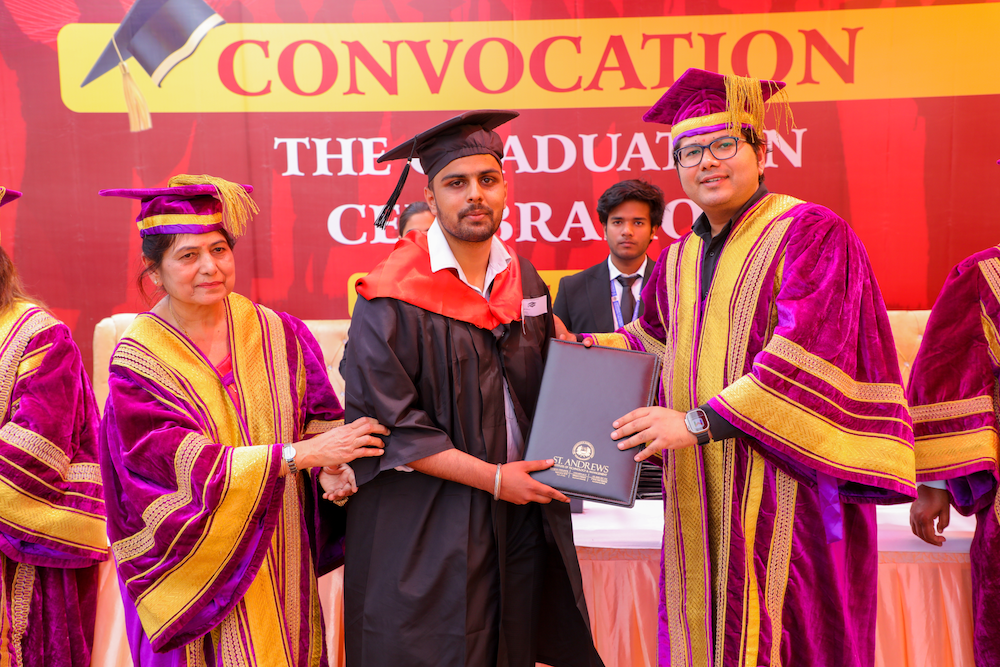
Job Profiles and Top Recruiters
There are various career options to pursue after completing the BCA course.
Some of the job profiles that one can bag after completing a BCA courses are:
- Software Developer
- Technical Analyst
- System Administrators
- Programmer
- Tech Support
Government organizations like the Indian Air Force (IAF), Indian Army, and Indian Navy hire a large number of computer professionals for their IT departments.
Some of the leading IT companies recruiting BCA graduates and offering excellent salary packages include:
- Apple
- HCL
- Wipro
- NIIT
- IBM
- Capgemini
- Infosys
- Accenture
- Oracle
- TCS
Companies like Wipro, Infosys, and TCS actively recruit BCA graduates for various IT roles.
FAQs
Can a 12th commerce student go for BCA?
Yes, a 12th commerce student can pursue BCA after completing 12th commerce.
Pursuing BCA after 12th commerce can be a practical and rewarding option.
Commerce students can develop strong analytical skills, which are highly transferable to computer science.
Is BCA a good course after 12th commerce?
Yes, a Bachelor of Computer Applications (BCA) can be a good course after the 12th in commerce, especially if you have an interest in computer programming, software development, and computer applications.
The course covers various aspects of computer science, such as computer networks, database management, software engineering, web designing, and programming languages.
Certainly! Here are some frequently asked questions (FAQs) related to BCA (Bachelor of Computer Applications) eligibility criteria:
What is the minimum educational qualification required for BCA admission?
Generally, candidates must have completed their 10+2 education from a recognized board or institution.
Do I need to have studied specific subjects in my 10+2 to be eligible for BCA?
Most institutions require candidates to have studied Mathematics as one of the main subjects in their higher secondary education. Some may also prefer candidates with a background in Computer Science or Information Technology.
Do I need to appear for an entrance exam for BCA admission?
It depends on the institution. Some colleges or universities conduct entrance exams for BCA admissions, while others may admit students based on their 10+2 marks. Candidates should check the admission guidelines of the institution they are interested in applying to.
What is the minimum percentage required in 10+2 for BCA course admission?
Most institutions have a minimum percentage requirement, which usually falls between 45% to 50% in aggregate. However, this percentage may vary from one institution to another.
Are there any reservation criteria for BCA admissions?
Yes, admission to BCA courses may be subject to reservation criteria as per government regulations. This includes reservation for categories such as Scheduled Castes (SC), Scheduled Tribes (ST), Other Backward Classes (OBC), Economically Weaker Sections (EWS), and Persons with Disabilities (PwD).
Is it possible for me to seek enrollment in the BCA course if I’ve taken a gap year after finishing my 10+2 studies?
Yes, candidates with a gap year after completing 10+2 are generally eligible to apply for BCA admission. However, they should check the specific requirements of the institution they are applying to, as some may have their own policies regarding gap years.
Can I pursue BCA after completing 12th commerce?
Yes, students who have completed their 12th standard in commerce stream are eligible to pursue BCA, provided they have studied Mathematics as one of the subjects.
Do I need to have a background in Computer Science to pursue BCA after 12th commerce?
No, having a background in Computer Science is not mandatory for BCA admission. However, candidates should have a basic understanding of Mathematics, which is essential for BCA coursework.
Are there any specific subjects I need to have studied in 12th commerce to be eligible for BCA?
While there are no specific subject requirements other than Mathematics, having a strong foundation in subjects like Accountancy, Economics, and Business Studies can be beneficial for certain aspects of the BCA curriculum, especially in areas such as business applications and information systems.
Will I face any challenges in BCA if I come from a commerce background?
While students from commerce backgrounds may initially find certain technical aspects of BCA challenging, most BCA programs are designed to provide foundational knowledge in computer science and gradually build upon it. With dedication and effort, students can successfully navigate the BCA coursework and excel in the field.
What career opportunities are available after completing BCA with a commerce background?
Graduates with a BCA degree, regardless of their academic background, have a wide range of career opportunities in areas such as software development, web development, database management, networking, and IT consulting. Additionally, they can pursue higher education in fields like computer science, information technology, or management.
Do I need to appear for any entrance exams for BCA admission after 12th commerce?
It depends on the institution. Some colleges or universities may require candidates to appear for entrance exams like CET (Common Entrance Test) or conduct their own entrance exams for BCA admissions, while others may admit students based on their 12th marks. Candidates should check the admission guidelines of the institution they are interested in applying to.
Are there any advantages of pursuing BCA after 12th commerce?
Yes, having a commerce background can provide students with a unique perspective and skill set that can be valuable in certain areas of the IT industry, such as business analysis, project management, and software testing. Additionally, it can open up opportunities for interdisciplinary roles that bridge the gap between technology and business.

